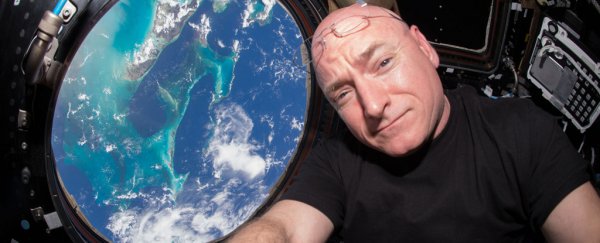After an incredible and highly publicised mission in space lasting for almost an entire year, NASA astronaut Scott Kelly will return home to Earth next week alongside Russian cosmonaut Mikhail Kornienko.
The pair, having completed their historic 'one-year mission' will touch down in the Kazakhstan desert at approximately 11:27pm ET Tuesday March 1, with fellow International Space Station (ISS) inhabitant, cosmonaut Sergey Volkov, joining them for the ride. The return to Earth will cap off a remarkable consecutive 340 days in space for Kelly and Kornienko, a station-record for the ISS.
"It's kind of like I've been in the woods camping for a year, with hygiene," Kelly told the press in his final media conference from orbit before returning to Earth. "The fact things float makes your everyday life more difficult."
The mission, which has run for twice as long as a typical stay on the ISS, wasn't just to conduct the usual gamut of space-based experiments – which, during Kelly's most recent expedition, have included such highlights as liquid ping pong, blooming space flowers, and eating lettuce grown in orbit.
Instead, one of the core goals of the year-long project was to examine the effects – both physical and psychological – on astronauts during such long-duration spaceflight. In that sense, NASA views the mission as a stepping-stone towards future missions taking humans to Mars and beyond.
Despite the long exposure to weightlessness and solar radiation, both of which are known to take a toll on the body, Kelly said the rigours of spending so long in space were primarily psychological.
"Physically, I feel pretty good," he said. "The hardest part is being isolated, in a physical sense, from the people on the ground that are important to you… There is certainly a loss of connection [to] the folks on the ground that you feel for and love."
Needed a little humor to lighten up a #YearInSpace. Go big, or go home. I think I'll do both. #SpaceApehttps://t.co/Ift8VdDR4C
— Scott Kelly (@StationCDRKelly) February 23, 2016
Not that Kelly's latest foray in space – his fourth visit, giving him a tally of 520 days off Earth by the time he touches down – has turned him off ever returning.
"I could go another 100 days, I could go another year if I had to," he said. "It would just depend on what I was doing and if it would make a difference, although I look forward to getting home next week."
When he does get back, Kelly will be flown to Houston to undergo what's expected to be an exhaustive series of physical tests, which will also compare his physiology and health to that of his twin brother, former astronaut Mark Kelly.
Mark has been undergoing tests of his own on Earth during his brother's time on the ISS, the results of which will help scientists examine what the effects of a long stint in space really are.
Once that's done, he hopes to take a dip in his pool, spend time with his girlfriend and two daughters, and look into the next stage of his scientific career.
"The more I look at Earth and certain parts of Earth, the more I feel an environmentalist," he said. "I hope to do more when I get home in helping to protect Earth."
You can check out Kelly and Kornienko's home journey live on NASA TV next Tuesday March 1, with farewells and hatch closure on the ISS kicking off at 4:15pm ET.
